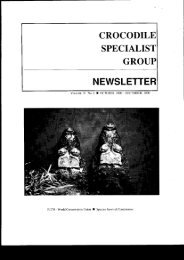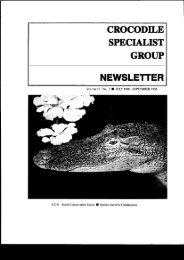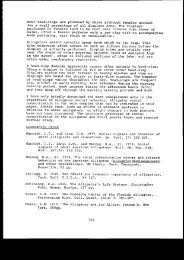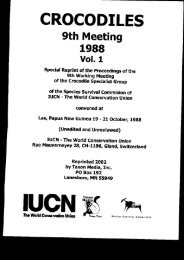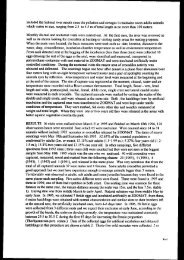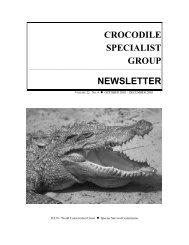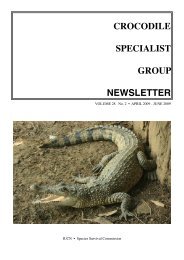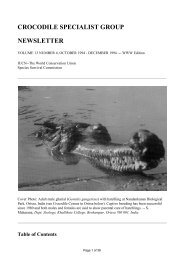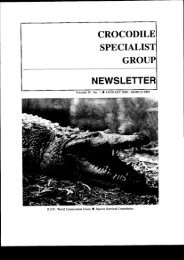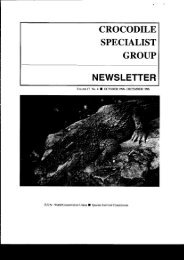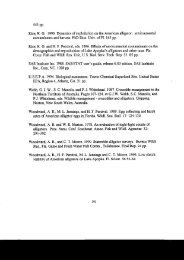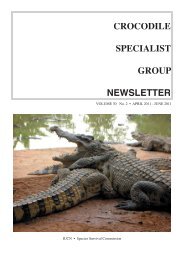size: 5036KB - Crocodile Specialist Group
size: 5036KB - Crocodile Specialist Group
size: 5036KB - Crocodile Specialist Group
You also want an ePaper? Increase the reach of your titles
YUMPU automatically turns print PDFs into web optimized ePapers that Google loves.
PRESENTATION FROM THE MINISTER OF EN!'IRONMENT AND TOURISM<br />
TO OPEN THE llth WORKING MEETING<br />
OF THE IUCN/SSC CROCODILE SPECIALIST GROUP<br />
Welcome to Zimbabwe. It gives me great pleasure to open this meeting of the<br />
<strong>Crocodile</strong> <strong>Specialist</strong> <strong>Group</strong> with a few comments which I hope prove to be<br />
appropriate and contribute to the spirit of your meeting.<br />
From the perspective of the early 1970's, when it seemed that hunting would never be<br />
controlled, crocodile conservation must bave looked very depressing ind it is no<br />
wonder that all the species were placed on the CITES Appendices when the<br />
Convention was colcluded.<br />
Since then, of course, it has been recognised that s€veral of the most resulcrrve<br />
listings, on Appendi! I, were not appropriate and in addition the status of many<br />
sp€cies has improved. As a result, crocodiles have been on the agenda at CITES for<br />
many yeals and over the last 20 years, we bave come to expect tf,e crocodiles to be at<br />
the cutting edge of innovative conservation, especially in tte CITES context.<br />
Before expanding on this, it is worth pointitrg out that the establishment of CITES<br />
clearly drew the battle lines between those whose answer to the abuse of a natural<br />
resource is prohibition, and those who believe that the answer to abuse is better<br />
manag€mento give sustainable use. In Zimbabwe we subscribe to the latter view,<br />
especially since we strongly betev€ that sustainable use is a strong conservation tool<br />
in many circumstances.<br />
It would seem that this principle is more readily accepted and demonstrated with<br />
crocodiles than with any other species and we are clearly not the only people who are<br />
trying to conserve crocodiles through their use. I am happy that so many piople with<br />
similar experiences to those of Zimbabwe are here todav - I can assure'you ihat it is<br />
not often that I am asked to address an iotertrational aulience whrch almost<br />
universally believes in the same consewation philosophy as Zirnbabwe!<br />
I would now like to move back to the issue of crocodiles as conservation piotreers.<br />
Although CITES is often seen as a catch-all conservation heaw it onh addresses<br />
tade as a factor affectitrg the conservation of species. Where habitat ioss or other<br />
facto$ are causing the decline, as so often is thi case, CITES cannot really help.<br />
Indeed, it is our expe ence that under these conditions CITES is often a iefinite<br />
hinderence.<br />
Where a species is under pressure from habitat loss the intuitive r€action is to<br />
ircrease protection from exploitation by banning international trade,<br />
However, where the issue is habitat loss the removal of value from the soecies also<br />
remlves m-anagement options, Some lateral thinking and a great deal ofixperience<br />
l€ad us to believe that habitat loss can only be addressed by making it economically<br />
unattractive to convert wild lands to agriculture and settlemetrt. In ihis, intematiotr;l



